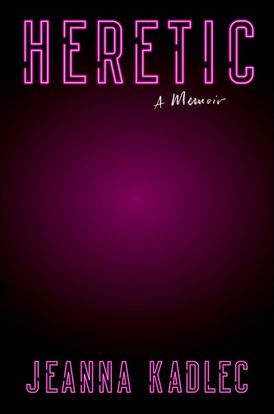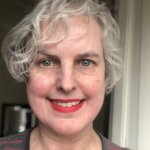Enough memoirs by queer ex-Christians (either evangelicals or Mormons) have been published in recent years that these books could have their own section at Hudson News. Jeanna Kadlec’s Heretic: A Memoir, out this fall, stands out, not because she went on to found an LGBTQ2S+-inclusive lingerie boutique or distributes a newsletter about “Astrology for Writers,” or even because indie musician Lucy Dacus blurbed her book. It’s because Kadlec sees the danger of evangelical Christianity clearly, as only someone who has been deep inside of it can.

Kadlec led her women’s Bible study as a college undergrad, married the guy who led the men’s Bible study (who was also a pastor’s son), then they both left small-town Midwest so she could join a Boston-area PhD program. There she met Tony, an out queer woman, also from the Midwest, with whom she had the “emotional affair” that was a deciding factor in leaving her husband; he had also turned abusive. Kadlec writes of her last sexual encounter with her husband: “Ask pretty much any woman I have ever slept with—I like rough sex.… But I only like it when I ask for it.”
Kadlec also writes with keen insight about the parallels between pop culture, mythology and her coming out and leaving the church. Xtra spoke to her by phone from her home base in Brooklyn, New York, shortly before the publication of the book.
One of the things that struck me is that when you identified as an evangelical Christian, before you came out, you were in a lot of places full of queer women: Women’s Studies, an East Coast PhD program and even on your honeymoon, which was in Provincetown. How did you think about the queer women in your life then?
I was friends with queer women in my women’s Bible study in college who were Unitarian or Episcopalian. I didn’t go to churches that were explicit in their homophobia, but when pressed by other hard-core evangelicals, I would say, “I believe homosexuality is a sin,” because to say otherwise was not acceptable. I thought, “I’m supposed to not be okay with LGBTQ people, but they’re a good person.” I certainly didn’t look too closely at the fact that they were the people I was most comfortable with.
I find the section of the book about Tony fascinating: it’s part of queer people’s experience I don’t often see in books, which is that you’re close to somebody and you spend all your time together and you never have sex. Even though everyone sees the chemistry between you two (and assume you’re a couple), the other person denies ever having romantic feelings for you. I know you’re happily partnered, but if you were single now and you met somebody who was an evangelical, married, straight woman, which is what you identified as when you first met Tony, would you consider starting a relationship with that person?
Absolutely not! I would never be involved with someone going through what I was going through, who wasn’t yet out. I have sympathy for Tony being like, “You are a car wreck in progress that I do not want to get that close to,” except for the part where she was already in the wreck with me.
The queer community is often a target of the white evangelical agenda. What’s the thing queer people get wrong about evangelicals?
This certainly isn’t exclusive to queer people, but folks who don’t have a religious background, any kind of religious background in the U.S., can be dismissive of evangelicals and Christians, even after they overturned Roe and gave Trump four years in office. People who practise non-Christian religions in this country are very aware that Christianity is embedded in politics, and they challenge the idea that church and state are separate. On January 6, 2021, [when protestors supporting outgoing president Trump stormed the U.S. capital], when the chambers reconvened after the attack, Nancy Pelosi, a storied, establishment Democrat, from fucking San Francisco, led a prayer to a Christian god on the floor of Congress.
You tweeted about receiving malicious one-star reviews on Goodreads from people who hadn’t read your book, because Heretic is about both being queer and ex-evangelical. This targeted, swarming behaviour is common on social media, especially on platforms that compile reviews from non-professionals. How did you counteract it?
I’ve asked folks who’ve read the book to review it, if they can. I know this is not a unique problem: it’s being encountered by other queer authors as well as authors who write work that’s critical of evangelicalism. But the way I dealt with it was to block Goodreads on my phone and my computer, so that I can’t go look.
Years after you left the church, when you were working on this book, you had two visions of Jesus in your apartment. Did you have visions of him when you were in the church?
Never.
What do you think of these visions? What would you do if you had another one?
I’m the kind of person who believes in a spiritual realm. I treat it as something that actually happened. I’ve had a number of supernatural experiences throughout my life. I am sharing this one because I want it to never happen again. My relationship with the church is finished. The relationship with Jesus was always separate. That relationship felt personal and real. These visitations feel like there’s still something that’s not communicated. And I’m not in a place yet to hear it.
When you were still a believer, did you wish for Jesus to appear before you?
Absolutely. When I was young, especially, and even when I was older, I could audibly hear his voice when I was praying. The experience of him was always real to me, in a way that I didn’t talk about. The experience of him was visceral. But I wished for more because, especially in our culture, we treat sight as confirmation, which is even in the Bible: “Blessed are those who believe and who have not seen.” It’s this idea that if you can see it, it’s real. The unseen is what’s uncertain.
You wrote fanfiction before you came out, and you write in the book about Dungeons & Dragons helping you to process your feelings about leaving the church. The power of fantasy is primal, especially for queer people. What role does fantasy continue to play in your life?
I am still playing D&D. Adults shut down that part of ourselves that wants to play. With my D&D group—all queer people—we’re creating this world that is divested of a lot of the systems and isms that we live with in everyday life.
You’re careful to say that your interest in astrology and tarot cards is not a substitute for Christianity, but the queer community, in my experience, gives more credence to, or at least tolerance for, mystical things than straight people do. Why is that?
It has something to do with the harm organized religion has done to queer people. And how queer people, through the process of coming out, are accustomed to creating ourselves from scratch: we often have a sense of openness. But queer people can sometimes treat those things with the dogmatic approach that comes from religion.
Evangelical Christians disapprove of astrology and tarot cards.
It’s witchcraft in the worst way for evangelicals. Tarot, astrology, ouija boards, shrines to other deities, ancestor work, treating the land itself as spirited, it’s all sinful.
Your mother accused you of being a witch and asked if you had the Mark of the Beast. How did you answer her?
At the time I could tell her I didn’t think I was a witch. Now I would answer that a lot of people who wouldn’t call themselves witches are witches by the church’s definition, myself included.
Which queer memoirs, by ex-evangelicals or not, did you want your own book to be like?
Garrard Conley’s Boy Erased paved the way. His book has been the most prominent memoir by a queer ex-evangelical and it was published by Riverhead, a well-respected literary imprint. Another memoir that influenced me was Melissa Febos’s Abandon Me. I read it in one sitting and was like, “Oh my God, you can totally do this. You can incorporate other literature and artistic meditations into a compelling personal narrative.”
What are some formative queer texts for you that you want all queer people to read?
Audre Lorde’s Sister Outsider, but especially the essay “Uses of the Erotic,” which I cite in Heretic. It’s key to understanding community and anger and the erotic. And I would say any book of Mary Oliver poems. There is an erotic quality to Mary Oliver’s poetry, but her relationship with nature is what’s most distinctive: observant and quiet. Her work is also stripped of hetero commitments. That’s two. If I keep going, it’ll be a monster of a list.
This interview has been edited for length and clarity.


 Why you can trust Xtra
Why you can trust Xtra


